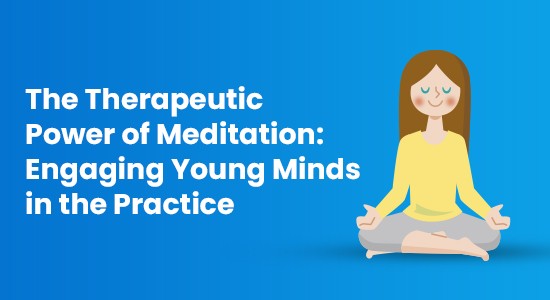The Therapeutic Power of Meditation: Engaging Young Minds in the Practice
The Therapeutic Power of Meditation: Engaging Young Minds in the Practice
Meditation, an ancient practice rooted in mindfulness and self-reflection, has gained increasing recognition for its positive impact on mental health and well-being. In the context of therapy, meditation can serve as a powerful tool for both practitioners and their clients. Meditation offers a range of benefits that align closely with the goals of therapy.
Meditation cultivates awareness of one’s thoughts, emotions, and bodily sensations, empowering young clients to regulate their emotional responses effectively. Through regular practice, they develop greater self-control, resilience, and the ability to navigate challenging situations with clarity and composure.

By encouraging introspection and mindfulness, meditation facilitates a deeper understanding of one’s inner experiences and thought patterns. This heightened self-awareness allows young clients to recognize and explore their underlying thoughts and emotions, leading to greater insight and personal growth.
The practice of meditation has been proven to lower stress levels and alleviate symptoms of anxiety. By teaching young clients mindfulness techniques, such as focused breathing or body scans, therapists provide them with valuable tools for managing stress, promoting relaxation, and enhancing overall well-being.
Meditation encourages a non-judgmental and compassionate attitude towards oneself and others. By fostering empathy and kindness, young clients develop healthy interpersonal relationships, improved communication skills, and a greater sense of connection with their peers and communities.
While meditation has traditionally been associated with older generations, young people are increasingly receptive to incorporating mindfulness practices into their lives. Here are some strategies for engaging young people in meditation:
- Tailor Techniques to Their Needs: Recognize that young people have unique preferences and learning styles. Incorporate meditation techniques that resonate with their interests, such as guided visualizations, interactive exercises, or the use of technology-based mindfulness apps.
- Make It Accessible and Relatable: Frame meditation as a practical and relevant tool for managing the challenges young people face in their daily lives. Discuss the potential benefits of meditation in terms of stress reduction, improved focus, and enhanced emotional well-being.
- Incorporate Mindfulness into Therapy Sessions: Introduce short mindfulness exercises at the beginning or end of therapy sessions to create a calming and reflective atmosphere. Gradually increase the duration and complexity of these exercises as the client becomes more comfortable with the practice.
- Provide Resources and Support: Recommend meditation apps, online resources, or books specifically designed for young people. Offer guidance and encouragement as they navigate their meditation practice, ensuring they have access to ongoing support and clarification of any questions or concerns.
While many young people are open to meditation, some may initially exhibit resistance or hold preconceptions about the practice. Here’s how one may address these concerns:

- Normalize any doubts or misconceptions young clients may have about meditation. Explain its evidence-based benefits and address any concerns they may have regarding religious or spiritual connotations.
- Emphasize that meditation is a flexible practice that can be adapted to suit their personal preferences and beliefs. Assure them that it can be integrated into their daily routines in a way that feels comfortable and authentic to them.
- Share success stories or testimonials from other young clients who have found meditation beneficial. Hearing about positive experiences can help dispel doubts and encourage engagement.


